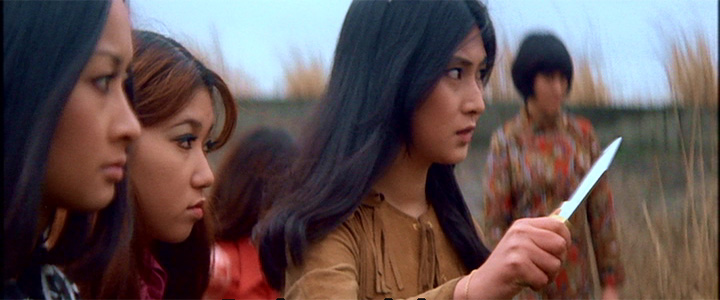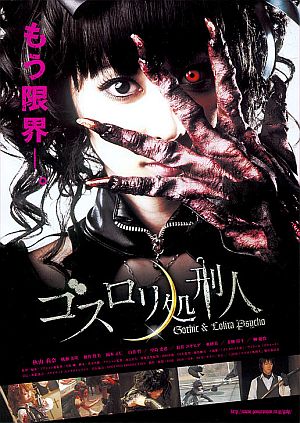★★½
“Not very violent, and certainly not pink.”
 When Rika (Oshida) gets out of reform school, she goes to visit her friend Midori (Katayama), and gets a job working in the garage belonging to Midori’s father Muraki (Ban), even though Midori is estranged from him – except when she needs money to pay off her boyfriend’s gambling debts to the local Yakuza under Boss Ohya (Nobuo Kaneko). Another friend of Rika’s is working in an “art studio”, doing nude modelling to support her sick husband, and still others are hostesses at the Ginza Girls cabaret, a dance-hall which Ohya’s gang are also extorting for protection money. After Muraki has to take a loan using the garage as collateral to pay Ohya, Rika tries to offer herself as an alternative to the boss. This goes about as well as you’d expect, though there’s a genuinely cool twist in which we find someone isn’t quite who we seem. There’s a tragic fatality, which sets the scene for all the girls to get together and take on Ohya’s gang.
When Rika (Oshida) gets out of reform school, she goes to visit her friend Midori (Katayama), and gets a job working in the garage belonging to Midori’s father Muraki (Ban), even though Midori is estranged from him – except when she needs money to pay off her boyfriend’s gambling debts to the local Yakuza under Boss Ohya (Nobuo Kaneko). Another friend of Rika’s is working in an “art studio”, doing nude modelling to support her sick husband, and still others are hostesses at the Ginza Girls cabaret, a dance-hall which Ohya’s gang are also extorting for protection money. After Muraki has to take a loan using the garage as collateral to pay Ohya, Rika tries to offer herself as an alternative to the boss. This goes about as well as you’d expect, though there’s a genuinely cool twist in which we find someone isn’t quite who we seem. There’s a tragic fatality, which sets the scene for all the girls to get together and take on Ohya’s gang.
As you can tell, there’s no shortage of plot going on here. However, the overall result is more like an overwrought Japanese soap-opera, with a lack of much delinquence, or indeed, real action of any kind from the girls, up until the last ten minutes. Indeed, there’s very little exploitation present at all, with a surprising lack of nudity as well, though personally, this is less a concern. Reading various reviews elsewhere, there is a broad spectrum of opinion as to whether this makes it the best or the worst in the series. I tend to be somewhere in the middle: while I can appreciate the dramatic elements, and the two lead actresses are good in their roles, it’s not what I expected at all, being too worthy, and completely lacking any sense of excess of transgression.
I’m definitely uncertain where the poster image comes from, although that may be because I had to look at it twice, since the first time I thought she was holding a yo-yo. Must have been some kind of residue from Sukeban Deka, I guess.
Dir: Kazuhiko Yamaguchi
Star: Reiko Oshida, Yumiko Katayama, Junzaburo Ban






 Misaki (Hoshino) is in prison for stabbing a policeman to death, but is taken from her jail to a remote island. There, she joins the rest of the hand-picked prisoners, who are there to be trained by a mysterious government organization, and moulded into operatives who can be used to protect national security. Most of the inmates just want to make things easy, sleeping with the guards in exchange for privileges, but Misaki is made of tougher stuff, and won’t buckle down to the authorities. While she begins plotting how to escape the island, she needs to overcome a number of problems, not least having no idea about where it is, and whether the small boat they stumble across will be capable of getting them to any other land.
Misaki (Hoshino) is in prison for stabbing a policeman to death, but is taken from her jail to a remote island. There, she joins the rest of the hand-picked prisoners, who are there to be trained by a mysterious government organization, and moulded into operatives who can be used to protect national security. Most of the inmates just want to make things easy, sleeping with the guards in exchange for privileges, but Misaki is made of tougher stuff, and won’t buckle down to the authorities. While she begins plotting how to escape the island, she needs to overcome a number of problems, not least having no idea about where it is, and whether the small boat they stumble across will be capable of getting them to any other land. First of all, “Gothic Lolita” is a Japanese style term; Lolita fashion is based on clothing from the Victorian era, and the Gothic sub-genre is…well, suitable for a Victorian funeral, basically. Quite why heroine Yuki (Akiyama) decides to dress like this, after her mother is murdered by a group of five thugs, is never satisfactorily explained. Actually, it’s never even mentioned, putting it alongside the issue of why her father (Yanagi) is apparently a Christian priest, now confined to a wheelchair as a result of the attack. Or where Yuki is now a skilled fighter, armed with a bulletproof, lethal umbrella that can kill you in a variety of ways. Where does she get those wonderful toys, to borrow a phrase.
First of all, “Gothic Lolita” is a Japanese style term; Lolita fashion is based on clothing from the Victorian era, and the Gothic sub-genre is…well, suitable for a Victorian funeral, basically. Quite why heroine Yuki (Akiyama) decides to dress like this, after her mother is murdered by a group of five thugs, is never satisfactorily explained. Actually, it’s never even mentioned, putting it alongside the issue of why her father (Yanagi) is apparently a Christian priest, now confined to a wheelchair as a result of the attack. Or where Yuki is now a skilled fighter, armed with a bulletproof, lethal umbrella that can kill you in a variety of ways. Where does she get those wonderful toys, to borrow a phrase. This teetered on the edge of a seal of approval, but didn’t quite make it. While there are some lovely moments, two great leads and the recreation of the pinky violence genre from the sixties and seventies, there’s just too much dead wood and pacing flaws, that leave it just short. Still certainly worth a look, with Asami (Asami) and Junko (Rena) going head-to-head as they battle each other for supremacy in the girl-gang world. Junko seems to have got the upper hand, leaving her rival buried for dead in the desert [or whatever passes for a desert in Japan]. But Asami is just warming up: she claws her way, literally, back from the grave, teams up with her old gang-members, and sets about extracting revengs on Junko and her crew.
This teetered on the edge of a seal of approval, but didn’t quite make it. While there are some lovely moments, two great leads and the recreation of the pinky violence genre from the sixties and seventies, there’s just too much dead wood and pacing flaws, that leave it just short. Still certainly worth a look, with Asami (Asami) and Junko (Rena) going head-to-head as they battle each other for supremacy in the girl-gang world. Junko seems to have got the upper hand, leaving her rival buried for dead in the desert [or whatever passes for a desert in Japan]. But Asami is just warming up: she claws her way, literally, back from the grave, teams up with her old gang-members, and sets about extracting revengs on Junko and her crew. Taking a minimalist approach to its plot, particularly for the first hour, it’s about Kotomi (Tsukui), who is on a quest to find the man (Kanai) who was responsible for killing her father (Nomura), a samurai who wanted to leave his sklls to her. To reach the killer, she has to battle her way through a series of lower-level minions, such as a pack of ninjas, a monk and Pocahontas [ok, that might be a stretch, but honestly, that was my first thought on seeing her]. However, after she has fought her way past these henchmen and henchwomen, to reach the boss
Taking a minimalist approach to its plot, particularly for the first hour, it’s about Kotomi (Tsukui), who is on a quest to find the man (Kanai) who was responsible for killing her father (Nomura), a samurai who wanted to leave his sklls to her. To reach the killer, she has to battle her way through a series of lower-level minions, such as a pack of ninjas, a monk and Pocahontas [ok, that might be a stretch, but honestly, that was my first thought on seeing her]. However, after she has fought her way past these henchmen and henchwomen, to reach the boss  It isn’t
It isn’t  If the
If the 
